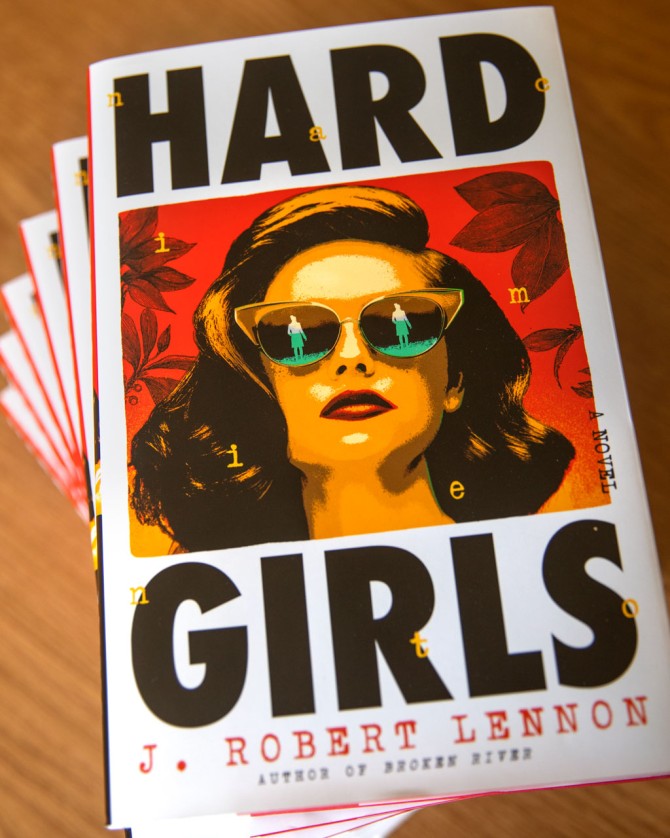For writer J. Robert Lennon, the plot was hatched on a walk with his wife.
He’d been enjoying the work of literary writers who had recently turned to crime fiction – Colson Whitehead, Dan Chaon, his friend Adam O’Fallon Price, MFA ’14 – and he realized he was a little jealous of them. After all, Lennon has been an avid reader of the genre his whole life. And, as readers of his eclectic oeuvre know, he loves a literary exercise.
“I joked that I should do a thriller series, and spitballed, off the top of my head, the silliest thing I could think of: badass twin sisters, estranged by a traumatic event in their past, whose mom may or may not have been in the CIA,” said Lennon, the Ann S. Bowers Professor of English in the College of Arts and Sciences. “And before I even finished laughing, I was working the angles, trying to figure out how to make something like that plausible, entertaining and emotionally rich.”
For all its dark subterfuge and espionage hijinks, the heart of Lennon’s book is the relationship between twin sisters Jane and Lila Pool.
The result: “Hard Girls,” his 10th novel, published Feb. 20 by Mulholland Books. While in the past Lennon has played around with genre elements – from mazy, existential mysteries to dystopian satire – “Hard Girls” is his first straight-up thriller.
He drew inspiration from classic and contemporary crime writers, among them Lee Child, Tana French, Richard Stark and Patricia Highsmith, plus a few unlikely outliers.
“My joke elevator pitch is that the sisters are Anna and Elsa from ‘Frozen’ crossed with ‘Jack Reacher,'” he said. “The royal family of Arendelle, with fists like frozen turkeys.”
Lennon honored many conventions of the genre – family intrigue, shadowy government operatives, international travel and wild gunplay – putting his own spin on some tropes while bucking against others.
“As much as I love a good police procedural, I didn’t want any cops in this series. They are always just over the horizon, not quite noticing what’s going on,” he said. “And I’m never going to name the music the characters are listening to, or the booze they’re drinking. They like talk radio or silence, and half of them are recovering alcoholics.”
In early drafts, Lennon had to actively strip away some of the overt literariness, but overall, genre distinctions don’t mean all that much to him. It’s all one big sandbox. And his indelible voice – witty and avuncular, playful and accessible – remains intact.
“I wanted this to be a departure, and I tried to make it one, but ultimately it really is recognizable as my work. It’s plottier, but I’ve always liked plot. It’s over the top, but I’ve never been a straight realist,” he said, citing his novels “Broken River” and “Familiar” as kindred works.
For all the dark subterfuge and espionage hijinks, the heart of the book is the relationship between twin sisters Jane and Lila Pool, whose lives splintered in high school and who now follow very different paths. Jane is a suburban mom who does administrative work at a local college. Lila, the wilder sibling, has been AWOL for a decade until she starts sending Jane encrypted messages. The backstory of their early trauma and fracture is braided through their present-day mission to track down their mother while they themselves are pursued by clandestine figures, and their academic father reckons with a mystery of his own.
Part of the fun, Lennon said, was figuring out how far he could delve into the technical aspects of a thriller – the trickery, the tradecraft – without losing sight of what makes the sisters’ relationship special.
“I think when a family is troubled, siblings have to rely on each other more, and can also come to resent each other more,” he said. “The sisters’ terrible mother shaped them as much by her absence as by her presence, and the two women’s personalities formed around different aspects of hers.”
A weird hike
Lennon’s path through publishing has been its own kind of tense thrill ride.
His first two novels, “The Light of Falling Stars” (1997) and “The Funnies” (1999), were published by Riverhead, an imprint of Penguin. Sales were healthy. Reviews were good. His career was off to a promising start.
“I started out when people still thought they might be able to make a living at this,” he said. “I got overhyped a couple of times, then dumped.”
His third novel, “On the Night Plain,” landed at Henry Holt after Riverhead rejected it, but the book had the misfortune of being published in September 2001. (Lennon learned of the terrorist attacks at the beginning of his book tour; he was standing in an airport, wondering why all the flights were cancelled.)
“You have all kinds of failures for reasons you can’t predict,” he once said in an interview. “Your career is not on rails. It’s a weird hike through the wilderness. And you have to kind of enjoy having it even when no one is paying attention to you.”
His hike got even weirder: His fourth novel, “Mailman” (2004), was rejected by Holt and published by W.W. Norton, which accepted his next novel, “Happyland,” only to cancel the book’s publication “over paranoia about lawsuits,” Lennon said.
The darkly comic satire was inspired by the story of American Girl magnate Pleasant Rowland, who controversially gave $40 million to Wells College in Aurora, New York, to revitalize its downtown; many people criticized the gift as a ploy to remake the town in her image. Lennon created a wholly fictionalized world with a very different character at its center, but Norton balked and his agent dropped him.
Happily for “Happyland,” Harper’s Magazine took the rare step of serializing an abridged version of the book across five issues in 2006 – the first time it had done so in 50 years. In 2013, the complete novel was published as an e-book.
After that experience, Lennon began to feel commercial publishing was a waste of time, he said, and since the late 2000s his literary work has been issued by Graywolf, a renowned nonprofit press that he calls “the very greatest of independent publishers.”
“I’ve made less money and been much, much happier,” he said.
It’s a lesson that is hopefully not lost on his students, who have included such literary success stories as Téa Obrect, MFA ’09 and Ling Ma, MFA ’15.
“I think young writers today are in an excellent position to start unusual careers amidst a flourishing of new small presses,” he said. “There will still be a select few who get a big paycheck and some minor fame, but I think that indies have moved in and brought new life to territory abandoned by the big presses. I hope my students will embrace the artisanal peculiarity of the industry and make writing a labor of love.”
As his publishing trajectory shifted, Lennon’s fiction grew more “creepy, ‘thrillery’ and fantastical.” But he has not completely abandoned the big publishing houses, nor they him. His new sideline in crime is being published through Mulholland, an imprint of the Hachette Book Group that is known for edgy and quasi-literary mysteries. He’s already putting the finishing touches on the next entry in the series, “Buzz Kill.”
A sense of place
“Hard Girls” marks the return of Nestor, Lennon’s fictional stand-in for Ithaca. Much like the late Alison Lurie‘s Corinth, Nestor serves as a proxy for everything Lennon loves, and sometimes lovingly satirizes, about the town where he has lived for decades.
“My oldest daughter read an early draft and immediately asked, ‘Is this part of the extended J. Robert Lennon literary universe?'” Lennon said. “Place is really important to my fiction, but not in the sense that I want to accurately portray real places … I just want to evoke the sense of a place, fictional or not. To make it feel lived in. ‘Hard Girls’ goes to some places I’ve never actually been, including Panama, rural Missouri and prison, so I watched a lot of YouTube road trip videos and read a lot of testimonials.”
Lennon, who grew up in Phillipsburg, New Jersey, and received his bachelor’s degree and MFA from the University of Pennsylvania and University of Montana, respectively, moved to Ithaca in 1997. He and his first wife lived in a house where a notorious local murder had taken place, and they made a living through freelance writing and teaching at regional colleges (Wells, Syracuse University, Ithaca College) and “freeloaded at the local libraries.”
Lennon came to Cornell as a guest lecturer in the Knight Writing Program in 1998. In 2004, he was offered a visiting professorship and taught several undergraduate writing classes. In 2006, he joined the Department of Literatures in English’s Creative Writing Program.
For Lennon, writing and teaching are not separate spheres. They are deeply connected.
“I try to share with students whatever I’m trying to puzzle out in my work, and I learn about my own work trying to help guide theirs,” he said. “You think you’ve seen it all, but you never have – it’s a real delight to encounter new literary problems I’ve never seen before, and to perpetually have to justify to other people why I think something is or isn’t good. Students are always upending what I thought was settled law.”
On top of all of that, he also finds time to edit EPOCH, Cornell’s long-running literary magazine, and he is a longtime musician. As with his writing, his music romps across borders, from indie rock to electronica to the rootsy Americana of the Starry Mountain Sweetheart Band.
Despite the dramatic twists in his career and his evolving aesthetics and interests, Lennon sees a consistent thread running through it all.
“I feel as though I’ve gotten a little less sentimental and cloying, a little more enigmatic and oblique. But I’d like to think there’s an overarching clarity and accessibility to my work,” he said. “I do experiments now and then, but ultimately I’m always singing Nina Simone … ‘I’m just a soul whose intentions are good…oh lord, please don’t let me be misunderstood…'”
Lennon will hold a book launch event Feb. 21, 7 p.m., at Ithaca’s Odyssey Bookstore, 115 W. Green Street.









